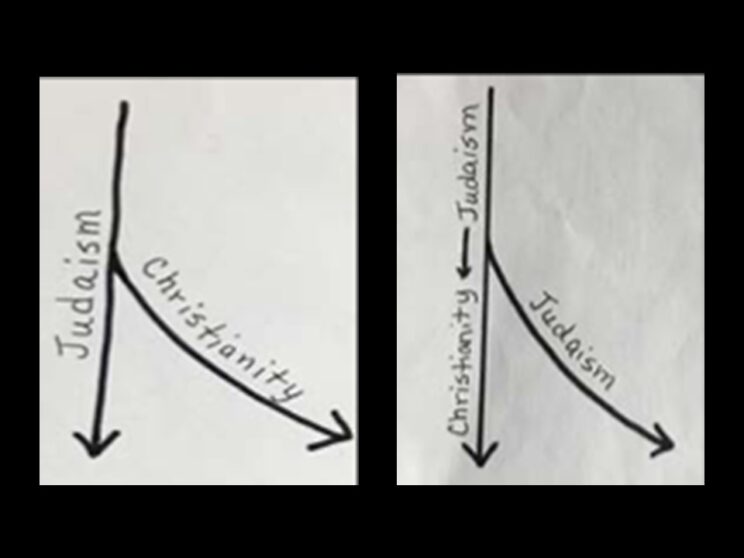We appreciate Rick Mattson sharing this excerpt from Witness In The Academy: a guide for graduate students, faculty, and those who minister with them. Rick will be joining ESN in a live conversation about our witness in the academy Thursday February 29 at 8 pm ET. We’d love for you to join us by signing up at tinyurl.com/ESNWitness.
As a speaker and trainer for InterVarsity’s Graduate Faculty Ministries (GFM), I find myself frequently on airplanes as I travel to campuses around the country. One afternoon on a flight to St. Louis I sat near a young woman named Ruth. She was in seat 21C, I in 21A. 21B, between us, was empty. I asked if she lives in St. Louis. “I go to school there,” she replied.
“Wash-U?”
“Yes, studying medicine.”
“Wow, I could never do that. Must be hard.”
“It’s a challenge but I love it. And you?”
“ College campus ministry. Headed to a conference in St. Louis. Ever heard of InterVarsity? There’s a chapter at your school.”
“Yeah, one of my friends goes to InterVarsity. What do you do there?”
Only sixty seconds gone, and I was fully engaged. The Lord had opened a door. Ruth was sharp and conversational. “We study the Bible and try to apply it to our lives. You ever read the Bible?”
“I’m Jewish, Reformed. Not really practicing Judaism. So, no.”
I asked, “How do you define what it means to be Jewish? I’m told by my rabbi friend that it’s an ongoing discussion in the Jewish community.”
“True. Not everyone agrees on a definition. My parents are both Jewish, so I was born into it.”
We talked a bit more about Jewish identity — Orthodox, Conservative, Reformed, secular. Something along those lines.
Then she asked about my Christianity. “I’m an evangelical Christian,” I replied.
“What does evangelical really mean?”
“Evangelicals believe in the authority of the Bible and all that it teaches about Christ and salvation.”
“So, you take the Bible literally?”
This question comes up often in my travels. I was ready for her. “Just the literal parts,” I said with a smile.
She laughed, but after a moment’s pause turned serious. Looking me straight in the eye, she spoke abruptly, “Rick, am I going to hell? Please tell me. I want to know what you think. I won’t be offended by what you say.”
Whoa, maybe I was in over my head. I’d walked through an open door and, as it turned out, stepped into some deep waters. And maybe at this moment, I was sinking . . .
For the purpose of this section, let me suggest as a general principle that when the Holy Spirit creates a conversation, anything can happen. There’s no denying that God had gone ahead of me on the flight to St. Louis and had prepared Ruth–and me–for a lively encounter.
Following God is the key
Just to point out the obvious, it wasn’t my cleverness or training as an evangelist that enabled this little dance with Ruth at 30,000 feet to take place. I’m not that smart, not that creative – nor do I want to be. I don’t want to manipulate, sell, impose, or presume. I only want to follow God into relationships and conversations. That’s it. And in higher education, where so much is on the line for Christian graduate students with their advisors, Principal Investigators, other professors, fellow students, colleagues at work . . . fear of evangelism can easily set in. If you’re a graduate student, faculty, or staff, consider how you might follow God deeper into relationships and spiritual conversations, neither working ahead of the Holy Spirit nor falling behind. Only if you pause and pray and wait for his leading will you notice his footsteps out ahead of you. And only then, as you track with those footsteps, will effective witness take place.
But don’t wait passively. Be active in your spiritual research. Exercise discernment in watching for a move of God in the life of the person near you who’s not a believer.
Ruth Part 2
Remember Ruth’s candid question to me, mentioned above: “Rick, am I going to hell? Please tell me. I want to know what you think. I won’t be offended by what you say.”
When Ruth asked that question, I hesitated. But she reassured me: “Seriously. I want to know.”
Looking back across the empty seat between us, I could no longer see Ruth’s face. Just her profile in the fading 6pm light, framed in the cabin window at 30,000 feet. “Hell is a place God will never bother you again,” I said. “None of his good gifts will be there. Is that what you want? It’s your choice.”
“I believe even an atheist will be accepted by God if they’re a good person. More so than a bad religious person,” she asserted.
“May I challenge you with something?” I asked.
“Sure.”
“It sounds like you’re saying that anyone who’s a good person will be accepted by God. It doesn’t really depend on any religious commitments.”
“Right.”
“That goes against what Jesus claimed. He said the only pathway to God is through him. It sounds like you’re saying Jesus was mistaken.”
“Yes . . . I suppose I am.”
“If Jesus really is the Son of God, don’t you think we’re wise to listen to his teachings?”
“I hadn’t thought of it that way.”
“Never sit by an evangelist on an airplane,” I grinned.
She laughed and waved a hand. “No, I love these conversations. I find them enlightening.”
“You’re a brave soul.”
I asked about her studies. She feels called to be a doctor (like her father), to help people in need. She explained their affiliation with an organization that provides free medical services to the rural poor in Latin America. She was articulate and impressive. God was with me. I suggested she think of her calling and abilities as divine gifts and that if she would connect them to Jesus, they’d come alive more than ever. She’d be empowered beyond her imaginings.
“I’ll have to think about that,” she reflected.
St. Louis was imminent. Before touchdown, our conversation took one more remarkable turn, which I’ll share below.
Debrief
During my interaction with Ruth, I was praying silently – listening in stereo, actually, with one ear tuned to Ruth, the other to the Holy Spirit. I seemed to get nudges from the Spirit to ask certain questions and take certain risks. The critical issue was, of course, how far God had prepared Ruth. That’s how far I wanted to go in the dialogue. No further. But certainly, no less. Since most of us in the grad world are naturally cautious and respectful, we probably don’t go far enough in many conversations. We’re afraid of offending or losing a friendship. But the question persists: How far has the Holy Spirit taken this person? That’s a much different question than how far we would go in our own abilities.
Ruth Part 3
I’d like to close by relating the third and final portion of my conversation with Ruth in 21C.
“I have a diagram for you,” I said to Ruth.
The light was dim in the cabin as the pilot announced our initial descent into St. Louis.
“Okay,” Ruth nodded.
“Here’s Judaism,” I drew a vertical line in the air, top to bottom. “And here’s an offshoot, Christianity.” This is how we normally think about Judaism and Christianity.
“Right.”
“But what if it’s the other way around?”
I continued to mime. “What if Christianity is the true Judaism and the offshoot is simply a holdover from Judaism of the past?”

Ruth regarded me for a moment without speaking. For the first time in an hour, I was aware of the low rumble of jet propulsion. Finally, I offered gently, “Am I pushing you too hard?”
“Not at all. I want to think about these matters. Maybe you should come and talk to students at Wash U sometime.”
“Just invite me. I come cheap.”
She smiled and we talked more about her campus.
The big Delta plane was barreling down through banks of dense clouds. Sensing the Spirit, I asked Ruth if I could put one final idea on the table. One I rarely use. She agreed without hesitation. I said carefully, “Perhaps God placed me here to talk with you on this flight.”
“You’re actually the second InterVarsity person I talked with today,” she responded.
I laughed. “Maybe the Lord is trying to get your attention. Anyway, I don’t want to get a messiah complex here. I don’t normally tell people that God placed me in their life.”
“It’s okay. I know what you’re saying.”
We deplaned and walked up the jet bridge together. In the terminal, there was a brief handshake as I gave her my card but didn’t ask for her info. “Email me if you wish,” I said lightly.
“Enjoy St. Louis.”
It was over. I kept my distance as we wound through the terminal. Lord, would you touch the heart of Ruth in 21C.
Debrief
I took several risks with Ruth which I believe were warranted. And in this conversation, it seemed wise to ask Ruth’s permission each time we moved forward to a new and more personal topic. In higher education, we often talk about the value of “consent.” Ruth gave her consent to an increasingly deep and more pointed dialogue throughout the flight. You may wish to try this: when a conversation becomes sticky, ask if the other person is doing okay. Or ask if you can bring up a new subject. Witness is, after all, a human endeavor. It should flow from our authentic selves. I never want to be dualistic – that is, artificially evangelistic. I never want to go from “normal” to “evangelistic” by temporarily putting on my evangelism hat (so to speak), just doing it as an activity, then going back to my regular self. Yes, there may be times when we are more intentional about witness. But in general, I want to “be” evangelism rather than just “do” evangelism.
Rick Mattson is a national evangelist and apologist for InterVarsity, speaking at over eighty campuses the past few years. He lives in St. Paul, MN with his family. He studied at Bethel Seminary of St. Paul, MN, where he received his masters in the philosophy of religion. As part of his current duties he serves as evangelism coach for graduate students at several universities. Rick’s a committed family man and serious golfer. He is the author of three books: Faith is Like Skydiving, Faith Unexpected and Witness in the Academy.


Leave a Reply